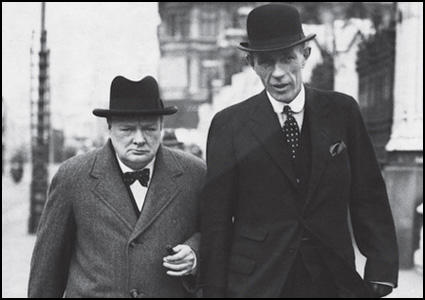Winston Churchill assumed the office of Prime Minister of the United Kingdom on 10 May 1940, just one day after Adolf Hitler marched his German forces into Denmark.1 What followed was a month of brutal bloodshed and agonizing uncertainty throughout the European continent. During this time, Churchill would find his nation on the brink of destruction, Hitler would see victory within his grasp, and a little known historical figure named Edward Wood, 1st Earl of Halifax would beseech his new Prime Minister to seek peace with the Nazi regime.2
Before Churchill took the job, Britain’s Prime Minister was a man named Neville Chamberlain. Chamberlain’s answer to the growing Nazi threat was the path of appeasement. He was not willing to throw his country into conflict so soon after World War I, and so he placated Hitler rather than openly opposing him. One of the most famous examples of this appeasement was the Munich Agreement. This pact, signed by France, Germany, Italy, and Great Britain in an effort to preserve peace on the European continent, effectively forgave Hitler for invading Czechoslovakia. Signed on 29 September 1938, the Munich Agreement stipulated that Hitler would not invade anymore countries; a promise he broke six months later. Blamed for the failure that was the appeasement strategy, Chamberlain was forced to step down from his position as Prime Minister. His successor was widely expected to be none other than his Foreign Secretary, Lord Halifax. Halifax declined the position. Though no one is exactly sure why, it is likely that Halifax felt that he was not suited to lead the country in time of war. 3 Therefore, the nation chose instead to turn to the man who had been the most vocal critic of appeasement: Winston Churchill. 4

Churchill had a daunting task before him as he took the office. Denmark had fallen, and all signs pointed to France following closely behind. One of his first acts as Prime Minister was to appoint a War Cabinet to advise him moving forward. As part of the Cabinet, Churchill appointed Neville Chamberlain as Lord President of the Council and asked Lord Halifax to keep his position as Foreign Secretary. 5 Churchill then sent the British Expeditionary Forces into France to help repel the Nazi invaders. Unfortunately, this move grossly underestimated German military capabilities, and British forces were in full retreat within a matter of weeks.
Since we know how the war ended, it is hard for us to fathom now just how dire Britain’s prospects were at the time. The Expeditionary Force was pinned on the Dunkirk Beach in France with seemingly no way of crossing the channel to get back to England. If the Germans managed to wipe out this force, which seemed imminent, Britain would have lost over 400,000 men and with them any hopes of ever stopping the Nazi conquest. In the face of utter annihilation, Churchill chose to stand firm. He ordered the commandeering of civilian boats to cross the channel and retrieve his soldiers, betting his country’s future on the long odds that these vessels could arrive before it was too late.6 Members of The War Cabinet did not share Churchill’s staunch optimism, most notable among them Lord Halifax.7 Halifax proposed a different tactic: a peace treaty with the Nazis. Halifax, being the skilled diplomat that he was, made contact Benito Mussolini, Prime Minister of Italy. Mussolini was willing to act as mediator so that Germany and the U.K. could sit down and negotiate terms for a peace agreement.8 From Halifax’s perspective this was the only way to ensure the survival of the troops trapped at Dunkirk, and the only way to save his beloved country. Though it seemed foolhardy at the time, Churchill refused to even consider peace negotiations.9 Luckily for him, and for our world, the civilian rescue mission succeeded, managing to bring most of the British troops home. Despite terrible odds, the United Kingdom lived to fight another day.

Assuming things had gone differently, and Churchill gave Halifax the go-ahead to broker a peace agreement, what might the treaty have looked like? The first thing to remember is, by all accounts, Britain was at the time posed to fall to German invasion. This meant that Halifax would have essentially been going to the negotiating table on his knees, making it unlikely that he could produce any favorable terms. Undoubtedly, Hitler would have used his advantageous bargaining position to get everything he wanted out of the deal. In exchange for safely getting the men out of Dunkirk, Nazis would have demanded that they be allowed to keep their conquered claims throughout Denmark, France, and other countries. Hitler also could have insisted that Britain not get further involved in the European conflict, allowing him to march towards Russia without worrying about the possibility of an active western front. Though it is impossible to measure whether 400,000 souls are worth such demands, it is important to keep in mind what precedent this would have set had the U.K. signed a peace treaty with Germany in Munich. Hitler took advantage of the Munich Agreement and disregarded it the moment he saw a tactical opportunity. Surely, no treaty Halifax could draft would have quelled the lust for power harbored by Hitler who stopped at nothing to establish a German world order. 10

All this we know thanks to well preserved historic records and the many biographies written since the war. We know that Churchill’s plan to resist at all costs did indeed pay off in the long run. But, looking at the events of the month of May 1940 through the eyes of the 1st Earl of Halifax, couldn’t one have concluded that the only hope for the United Kingdom was a final attempt at appeasement?
- Winston Churchill, The Gathering Storm (Boston: Houghton Mifflin Company, 1948). ↵
- Chris Hasting, “Lord Halifax tried to negotiate peace with the Nazis.” The Telegraph (August 30, 2008). ↵
- Andrew Roberts, The holy fox: a life of Lord Halifax (London: Papermac, 1992). ↵
- Ian Kershaw, Fateful choices: ten decisions that changed the world, 1940-1941 (London: Penguin Books, 2008). ↵
- Churchill, Winston. The Gathering Storm. (Boston: Houghton Mifflin Company, 1948), and Andrew Roberts, The holy fox: a life of Lord Halifax (London: Papermac, 1992). ↵
- Winston Churchill, The Gathering Storm (Boston: Houghton Mifflin Company, 1948). ↵
- Andrew Roberts, The holy fox: a life of Lord Halifax (London: Papermac, 1992). ↵
- Andrew Roberts, The holy fox: a life of Lord Halifax (London: Papermac, 1992). ↵
- Ian Kershaw, Fateful choices: ten decisions that changed the world, 1940-1941, (London: Penguin Books, 2008). ↵
- Arnold A Offner, “Appeasement Revisited: The United States, Great Britain, and Germany, 1933-1940.” The Journal of American History 64, no. 2 (1977): 373-93. ↵



90 comments
Haley Ticas
This article was very well written and interesting because it taught me something new, The Munich agreement. It also revealed the further involvement of the United Kingdom in World War II. I enjoyed that the author proposed questions of a possible alternate outcome. This got me thinking that history could have taken a completely different turn of events. Winston Churchill made the right move of not surrendering to the Nazi regime and instead and not signing a peace treaty.
Raul Colunga
Great article about an interesting time in world history. Many countries around the world were in a transitionary period during World War II and thinking about hypotheticals of what would happen if one country took control of another is interesting food for thought. If those British troops did not make it back home, what would England look like, or Europe for that matter if Germany had invaded?
Samuel Vega
When I think of Winston Churchill this early description of his career does not come to mind. It seems that he had to learn quickly and trust in himself on what strategies would work during the war. I was puzzled by his selection of Neville Chamberlain and Lord Halifax to his War Cabinet. If Chamberlain ruled with a least resistance strategy, why would Churchill want the influence on his War Cabinet? Lord Halifax appeared to underestimate the power of Hitler. Again, why would Churchill want him as part of the cabinet?
Kacey Diaz
This was a really informative article. If I hadn’t read this I never would have known what was going on from the UK point of view on WWII. This article had a lot of great details and it was really well written and interesting to read. I do believe that Churchhill had good judgment in the events that he ordered.
Lulu Avitua-Uviedo
This article had good details in areas many may not have known. Thank you for pointing them out. When it comes to negotiating, the process is always with uncertainty, so one has to stand their ground as Churchill did. Not everyone will be satisfied with the outcome and many may even oppose the final outcome. But as stated by another before, we learn from others and try to make better, stronger choices for the right purpose.
Maria Rivera
It shows great resilience that Churchill refused to consider peace negotiations, even to ensure the survival of the British troops trapped in Dunkirk. Despite the fact that Lord Halifax and members of The War Cabinet advised Churchill to initiate a treaty, Churchill stood firm in his stance. Fortunately, the civilian boat rescue mission was successful, and they were able to retrieve most British soldiers. It’s difficult to imagine how Britain negotiating a treaty with Germany would have influenced the course of events.
Aracely Beltran
Another job well done, very informative article. I wonder what would have happened if Churchill didn’t stand his ground. Sometimes I feel that things happen for a reason. Therefore, it was probably a good thing that Halifax declined the offer of leading the country during a time of crisis. Yes, Churchill may seem like a monster, but good thing his planned worked.
Stephen Talik
I am glad this talked about the failure to placate Hitler. Any attempts at a peace proposal with Hitler would have been ultimately futile, and would likely have made the Treaty of Versailles look tame in comparison. Hitler was going to try taking everything and would have certainly used the (seemingly) excellent hand he had at the time to the fullest extent.
Kendall Guajardo
This article showcased the process in which we must listen to our intuition or go with the most common way of life. Halifax was too scared to risk diving into the unknown. His positive outlook on securing peace with Hitler could have changed the course of history. On the other hand, Churchill could also have been the wrong one in power. We cannot all be great predictors of what peace will entail, especially in the negotiating process. This is why it is so important that we have developed a discipline like International Relations to learn from our mistakes and recognize major indicators that can influence foreign diplomacy. Hitler was a dictator, plain and simple. He was going to take all that he could and hope everyone would be too scared to practice realism because of the fear if war. In fact Churchill made sound judgement by not falling into the fear of war as war was already on the horizon.
Thiffany Yeupell
The notion of making peace with Nazi Germany irks me, but if the country was close to toppling and forces were endangered, I could see the desperation at this ‘final’ attempt. Nevertheless, the implications of making peace with Nazis would impact the very world that we live in today, especially as we see a rise in the Alt-Right in the US and European nations, historically democratic nations. Should we imagine that this peace treaty was workshopped and passed, and by chance, Nazi Germany still fell when the US finally joins the war, the very sentiments of Nazis today would greatly shift. From being outright despised by the majority of society, given cultivation of education occurred, had Nazis been able to achieve this treaty, and possibly cushion and grow their forces once again at a higher rate than that of today. The difficulty of keeping such ideology at bay would increase, as engagement with such an individual would be less frowned upon and essentially humanize the monstrosities that Nazi Germany had committed. The very precedent of Great Britain trying to appease and save face at the very last moments would indicate disintegration across the continent and the world.
But luckily, Winston Churchhill remains as a stubborn man, seeking solutions rather than defeat, and happened to be at the right place at the right time during this world war.